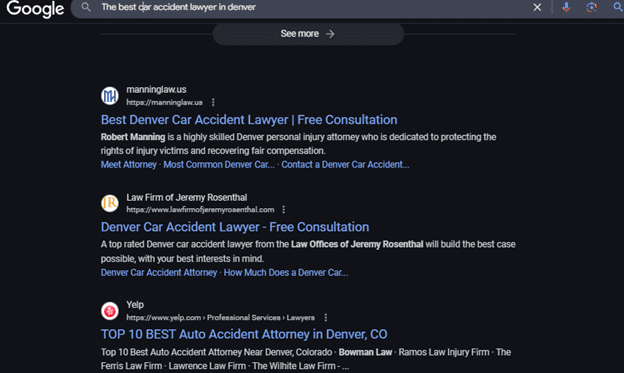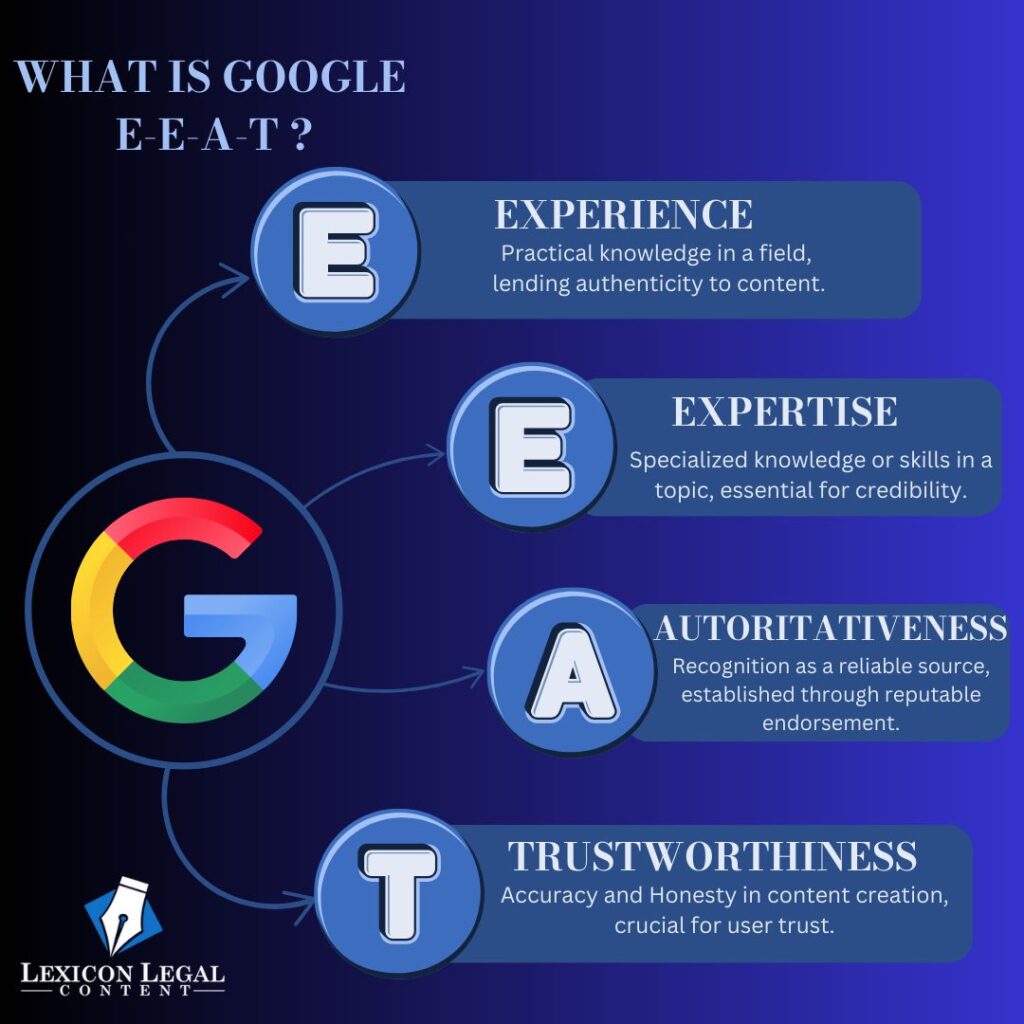Law firms tend to be in the slow lane when adopting modern marketing trends. The legal industry is understandably conservative, and that risk-averse stance is indeed reflected in content marketing successes and failures. What makes for stand-out, high-ranking attorney website content is often outside the comfort zone of most attorney brands. Safe, salesy content is regularly chosen over true thought leadership that converts readers not just into clients but into superfans who help expand your reach. Lexicon Legal Content can help!
Website Content for Law Firms: The Basics
Before we get started, let’s define some terms. “Content” refers to anything your law firm creates simply to offer value to your target market—articles, videos, infographics, podcasts, ebooks, printables, etc. “Website content” specifically refers to both blog articles and fixed pages on your law firm’s website that aim to educate, entertain, or otherwise help readers.
What Makes Law Firm Content Marketing Effective?
Stellar law firm website content builds relationships and creates trust with the audience. As Google says, “Focus on people-first content.” What does that mean? It means you are writing an article, creating a video, or designing an infographic with the primary purpose of giving something genuinely helpful to your target market, not with the goal of using a certain keyword phrase, hitting a certain word count, or boosting an SEO term that’s currently underperforming in your analytics. Of course, at Lexicon Legal Content, we are experts at finding creative ways to marry these two concepts, but good writing is non-negotiable.
Let’s break down what makes the difference between safe and high-performing law firm website content:
Creating Human-to-Human Connections
The best content marketing speaks directly to your audience in a relatable and authentic manner—it’s transparent. By adopting a conversational tone and using storytelling techniques, for example, you can create human-to-human connections that resonate with your target audience. This personal touch helps potential clients feel like you “get” them.
Give, Give, Give, Give, Ask
Too much law firm website content focuses on promoting rather than giving. However, the most effective content marketing takes a different approach. The right balance is to give 10 or more times before asking for something like a follow, visit to a contact page, or signing up for a newsletter. By consistently delivering high-quality content that educates, informs, and engages AND then asks for something, you build credibility that converts.
Avoid Creating Search Engine-First Content
In Google’s own words, you should focus on creating people-first content to be successful with Google Search rather than search engine-first content made primarily to gain search engine rankings.
When Lexicon Legal Content crafts content we strike the necessary balance between writing for humans while implementing SEO best practices. What we don’t do is look at your content as a keyword delivery system.
By providing thoughtful, relevant information, you not only improve your search engine rankings but also maximize what truly makes content marketing effective—the fact that it gives value that drives trust, loyalty, and authority.
How Does High-Quality Website Content Get Law Firms More Clients?
In today’s digital age, potential clients are increasingly turning to the internet to find legal representation. But how exactly does exceptional website content translate into new clients for law firms? Let’s explore the powerful connection between content quality and client acquisition.
Dominating the SERPs
The search engine results pages (SERPs) are the search engines’ results to a user query. In other words, it’s what you get back when you conduct a search.

By optimizing your website content with strategic keywords, the right balance of internal and external links, and truly brilliant writing, you increase your chances of appearing higher in SERPs. As you would guess, the higher you rank for relevant search terms, the more visible your firm becomes, leading to increased website traffic and more clients. Very few people scroll past the first few listings in an online search, so if you want to get clients online, you need great content.
Better Content Builds Trust
By providing clear, accessible explanations of complex legal concepts – from the nuances of employment discrimination to the steps involved in estate planning – you position your firm as a helpful resource that transforms overwhelming legal challenges into manageable processes. This educational approach helps potential clients feel more confident in reaching out for professional assistance, as they recognize both your expertise and your commitment to helping them understand their legal situation before they even schedule their first consultation.
Quality Content Gets People to Reach Out
Great content doesn’t just inform – it motivates readers to take the next step. Well-crafted content drives potential clients to reach out by highlighting time-sensitive legal matters, statutes of limitations, and the benefits of early legal intervention, helping readers understand why they shouldn’t delay seeking legal help. Strategic placement of contact information, consultation offers, and clear calls to action throughout your content makes it easy for readers to reach out when they’re ready. Each piece should include natural transition points that guide readers toward taking action. Remember that different readers prefer different methods of contact, so your content should highlight various ways to connect – whether through phone calls, contact forms, email, or live chat. This variety of options makes it comfortable for every potential client to reach out in their preferred way.
Authoritative Link Building
Quality content naturally attracts links from other reputable websites, which search engines interpret as votes of confidence in your expertise. When other legal resources, news outlets, or industry publications reference your content, it strengthens your firm’s digital authority.
Crafting Law Firm Website Content That Ranks
Creating content that ranks requires a strategic approach. This is where Lexicon Legal Content excels—we weave the nuts and bolts of SEO with the finesse of good writing. Here are a few key elements to consider:
Create Unicorns

In the world of SEO and content marketing, a “unicorn” is your break-out blog post that goes viral and generates a significant amount of traffic. It’s not uncommon for a unicorn to bring in as much as 70-80 percent of a law firm’s traffic.
How do you create a unicorn if you don’t already have one? What is the one blog post that only you could write? For example, if you are an immigration lawyer, but you are also someone who was granted citizenship through a VAWA petition, your unicorn blog post might be an insider’s guide to the Violence Against Women Act (VAWA) from the dual perspective of both an attorney and a survivor. Once you find the niche, then pour all of your story, experience, and knowledge into the post.
Be Aware that Your Law Firm Website is Held to a Higher Standard
YMYL is an SEO term meaning “Your Money or Your Life.” It refers to website content that can deeply affect the course of your life. As attorneys, understanding the YMYL philosophy is particularly important because legal issues can indeed be life and death.
Google holds YMYL content to a higher standard of excellence. If a gossip column publishes something inaccurate, the ranking penalty will be less significant than if an attorney did the same thing. Google pays close attention to the quality and credibility of YMYL legal content, so demonstrating your expertise becomes even more critical.
E-E-A-T (Experience, Expertise, Authoritativeness, and Trustworthiness)

E-E-A-T is Google’s guideline for what differentiates a poor blog post from a superstar. E-E-A-T is a primary factor in deciding whether to rank one article over another. E-E-A-T stands for experience, expertise, authoritativeness, and trustworthiness.
At Lexicon Legal Content, every law firm blog post we create is judged by our attorney editors on how much E-E-A-T it demonstrates. This can include information about your legal background, work history, previous cases, testimonials, or accolades you’ve earned to establish credibility and trust. Additionally, citing credible sources, referencing case studies and specific statutes, and providing valuable insights further enhance your law firm’s authority.
No Keyword Stuffing
Keyword usage must be natural and organic. “Keyword stuffing” refers to over-using a certain SEO-friendly phrase to the point that your article is awkward to read. It’s right up there with Blackhat SEO techniques, like leaving spammy blog comments that link back to your law firm’s website. Keyword manipulation makes your content less reader-friendly, which destroys the pure intent of offering readers helpful information. It also results in penalties from search engines. Yes, be strategic about putting a blog post together, but ensure your article remains reader-friendly.
Your Trusted Source for Stellar Law Firm Website Content
Let us worry about getting your law firm website content on page one while you focus on your clients. Lexicon Legal Content is a well-established, attorney-owned content marketing agency dedicated to helping hundreds of law firms around the country turn their websites into lead-generating machines. Contact us to discuss how we can help you grow your firm’s online reach today.




